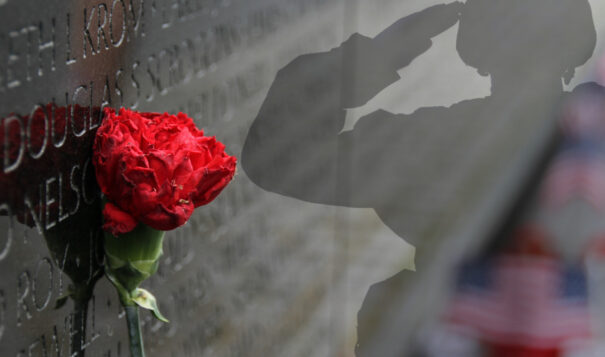Opinion Advocates for ideas and draws conclusions based on the author/producer’s interpretation of facts and data.
Service officers help Vietnam vets recover benefits 50 years after war
 Vietnam Memorial and saluting soldier - photo created by Sara Marcum
Vietnam Memorial and saluting soldier - photo created by Sara Marcum
TRIGGER WARNING: This story contains material regarding sexual assault and may be hard to read for some readers. The national StrongHearts Native Helpline is available 24/7 at 1-844-762-8483.
Memorial Day is fast approaching. This year marks the 50th anniversary of ending the Vietnam Conflict. More than 58,000 names of Vietnam vets killed or Missing In Action during that conflict are engraved on the Vietnam Veterans Wall in Washington, D.C.
Yet, as Hugh Clubfoot, a Northern Cheyenne Vietnam vet, noted, many more have perished from the aftereffects of war. Many suffered from post-traumatic stress disorder; drug and alcohol abuse; diseases caused by exposure to Agent Orange and other toxins; many winded up homeless; and others decided upon suicide.
The average age of a soldier in Vietnam who was drafted or voluntarily enlisted was 18-24 years old. Vietnam was the last time the draft was used in this country. Women also served in Vietnam in support positions, such as nurses or clerical workers. They were not allowed in combat.
“Many suffered from post-traumatic stress disorder; drug and alcohol abuse; diseases caused by exposure to Agent Orange and other toxins; many winded up homeless; and others decided upon suicide.”
Hugh Clubfoot, Northern Cheyenne Vietnam veteran
David Blair Morgan wasn’t drafted for the Vietnam War. He voluntarily left his home in Montana and enlisted in the Army when he was 17. It’s only been this year that Morgan, now 71, has told anyone about an experience at a stateside military post that scarred him physically and emotionally.
For many years, the Veteran’s Administration did not fully recognize Agent Orange or post-traumatic stress as a war-related illness. Many vets often received only minimal compensation for those service-related problems. Claiming a service-related disability is a very challenging, difficult paperwork nightmare for many veterans.
Morgan counts himself among the soldiers who could not navigate the system without help. Many veterans simply give up. They have so many questions. “What in the hell is a form 5-59?” Or, “How do I get it to where it needs to go?” Many do not have the internet, let alone know how to use it. Compound that problem by about 1000 percent for the homeless ones.
But there is hope for vets who have suffered for the past 50 years. Vietnam vets make up the largest contingent of veterans in the country. They are mostly in their 70s and 80s.
For the first time in his life, Morgan shared what happened to him. He was gang raped while going through advanced individual training right after completing basic training. The homeless vet was encouraged to seek more help from the military.
He was introduced to Lettie Irons Connell, who is from the Standing Rock Reservation. Connell is a dedicated veterans service officer, or VSO, who has assisted many veterans attain benefits they have earned. The wife of a Vietnam veteran, Connell, has been recognized for her work by the National American Legion. “I am glad to help,” she said.
“Talking about it can help. It is scary but worth it. They have not totally forgotten what we did 50 years ago.”
David Blair Morgan, Vietnam veteran
Morgan, 71, first met Connell on Feb. 7. She helped him file for additional benefits after researching his records. That process required him to participate in several doctor’s visits, typically conducted by QTC, an outside agency contracted by Veterans Affairs to ensure objectivity.
Morgan complied with several medical visits, including getting a general physical and seeing a nutritionist, and an ear, nose, and throat doctor and so on. The diagnosis varied. Then Morgan had to see a psychologist to determine if he suffered from post-traumatic stress disorder, or PTSD.
Morgan met the psychologist via a phone interview because he was unable to connect to Zoom. He asked: “How are you my dear?”
“Fine,” she answered. “And you?”
Morgan quickly resorted to the mode he had operated in for a half-century. He didn’t talk about when he was gang raped while at advanced individual training at Fort Huachuca in Arizona. The interviewer had his file. At age 71, it is still hard for him to talk about what happened. It’s always been easier to pretend everything was OK.
“I researched you,” she said. “Your file is five inches thick.”
The psychologist determined Morgan didn’t suffer from PTSD, only long-term depression and anxiety. But his service disability was increased from $170 a month to $1,071 a month, a life-changing financial turn for the homeless vet.
Related Story: After 40 years, Vietnam veteran finally shares what happened to him after basic training
With the continued help of the veteran’s service officer, Morgan will see an eye specialist to determine if his loss of vision in one eye is related to getting banged around while getting raped. After a recent appointment with a nutritionist, he found out he gained about two pounds. Things are looking up.
“To my fellow Vets, I say stick with it,” said Morgan. “There might be a brighter day. When you open Pandora’s Box, things can happen. Talking about it can help. It is scary but worth it. They have not totally forgotten what we did 50 years ago.”
